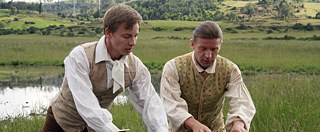Focus Theme:
2019 Humboldt and the Web of Life
Alexander von Humboldt was one Germany's most important explorers and was partly responsible for geography being recognized as empirical science. His research trips have taken him to Latin America, the Unites States and Central Asia, where he has conducted scientific fieldwork in a variety of fields, including physics, chemistry, geology, botany and astronomy. However, it was only recently that his early understanding of environmental issues became a focus of research. On the occasion of the German naturalist's 250th birthday, historian Andrea Wulf takes a breathtaking journey halfway around the world and takes the viewer to the rapids of the Orinoco and to the highest Andean peaks, which shaped Humboldt's new understanding of nature.
Director Details
Tilman Remme
- Categories Culture and History
- Original Title Terra X – Humboldt und die Neuentdeckung der Natur
- Produced by ZDF
- Running Time 43:30 minutes
- Country Germany
- Year 2019
Screened in
- Argentina
- Brazil
- Burkina Faso
- Egypt
- Jordan
- Kenya
- Malaysia
- Namibia
- Philippines
- Rwanda
- South Africa
- Sudan
- United Arab Emirates
- Palestinian Territories
